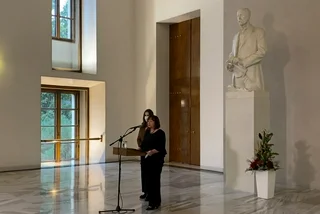Hospitalized President convenes new parliament for November 8
President Miloš Zeman has signed a decision to convene the new Chamber of Deputies on November 8, according to outgoing Speaker of the house Radek Vondráček and Zeman’s spokesperson. Vondráček said that the President’s health condition is improving and that he is capable of performing his presidential functions.
The Speaker said claims the President is disorientated are untrue, and that there is no reason for him to be stripped of his powers. Vondráček saw Zeman in Prague’s Central Military Hospital with presidential office head Vrastislav Mynář, in a visit not approved by Zeman’s doctors. The hospital criticized the meeting, saying only the people closest to the present are allowed to meet him and Vondráček is not among them, asking that all future official meetings be arranged in consultation with doctors.
Survey: majority of Czechs want information about Zeman’s health
A survey for Czech Radio has shown that 87 percent of Czechs want to know whether President Miloš Zeman is fit to perform his function. Zeman has been hospitalized in an intensive care unit in Prague since Sunday. Two-thirds of respondents to the poll said the presidential office should give general information about whether or not the state of the President’s health allows him to perform his duties. More than 20 percent think the public have the right to know specific details about Zeman’s health.
A tenth of the population think no information about the President’s condition should be published. This group consists largely of men with lower educational attainment living in small municipalities. People over the age of 60 are the least in favor of specific details being disclosed.
Škoda in trouble as production ceases due to supply chain issues
Škoda Auto, the Czech Republic’s largest automotive manufacturer, is suffering from a critical lack of vital chips, leading to a halt in production. According to the company’s unions, the situation is among the most difficult in Škoda’s recent history. The government will target assistance to the company after a meeting with representatives of automotive industry employers and trade unions.
If an agreement is reached, the state will again contribute to wage compensation for employees who are being prevented from working by the global shortages. It is thought the support is likely to be 60 percent of salaries: the same level of support provided within the Antivirus Covid support program operated by the government from May 2020 until June 2021.
Tick-borne encephalitis cases growing in the Czech Republic
Cases of tick-borne encephalitis last year were the highest in the Czech Republic since 2012. A total of 854 cases were recorded. The most-infected age group was people aged 60 to 64, while the number of infected small children doubled year-on-year, according to information from the National Health Office.
Health insurers say interest in vaccination against encephalitis has been increasing: as of next year, the vaccine will be free for all over the age of 50. The Czech Republic’s incidence rate of eight cases per 100,000 population is the highest of any EU country, and infected Czechs made up over 20 percent of all cases reported in the EU. Health authorities warn that ticks can still be active even at the end of the summer season, while the virus can also be transmitted through unpasteurized milk and dairy products. Encephalitis killed five people in the Czech Republic in 2020.
British film studio starts European expansion in Prague
British film production company HunkyDory has started its European expansion with a new office in Prague. The new venture is intended to allow the company to offer customers better production solutions and accessibility to more locations. HunkyDory leadership described Prague as “a wonderful shoot center with an incredible choice of amazing locations and studios, as well as offering high production resources at competitive rates.”
The company has shot in Prague many times in the past, making the city the logical base for its European expansion. Prague has assumed even greater prominence on the international filmmaking scene in recent years, as the Czech Republic continued to offer attractive incentives to foreign investors throughout the pandemic.
Ninth Signal Festival of Light starts in Prague
After being canceled last year due to the pandemic, the Signal festival is lighting up Prague spaces again this year. The festival, which started yesterday, includes 4 routes, 15 installations in public spaces, 6 installations in augmented reality, and a rich program of accompanying events.
This year’s novelty is a mobile app working with augmented reality for a route in Karlín, entitled “Signal AR,” complementing the popular Karlín and Old Town routes and a new one in Holešovice. This year’s Signal festival focuses on issues of sustainability. Those with tickets for last year’s cancelled festival can use their tickets this year instead.
Czech caviar to go to Asia in cosmetic products
A Czech biotechnology company has produced caviar-based cosmetics products aimed at the Asian market. Caviar cosmetics are particularly popular in China, and Český Caviár, from South Bohemia, is using caviar extract from sturgeons in Vodňany to create products aimed at Asian customers.
The company will market its products through the IC Mall trading platform, which focuses on the sale of European products in China. Český Caviár uses a rare extract from sturgeon eggs produced in laboratories of the Faculty of Fisheries and Water Conservation in Vodňany to produce creams and masks, targeted at Chinese customers as European cosmetics enjoy a strong reputation in China.












 Reading time: 4 minutes
Reading time: 4 minutes 


































